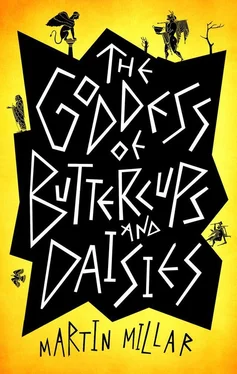‘— but we’ll be starting soon. Quite soon. It’s hard to say when exactly, but not too long, I would say. Almost certainly it will be not long from now…’
Aristophanes knew he was babbling. Hyperbolus and his claque started booing, which put him off further. A few pieces of fruit began to land on the stage.
‘Aristophanes is making fools of us!’ cried someone. One of Euphranor’s many paid flunkies, most probably.
‘Booooo!’
The barrage of fruit began to intensify. The combination of the heat, the tense atmosphere in the city, and the efforts of Hyperbolus and Euphranor to ridicule Aristophanes threatened to make events spiral out of control in record time. Aristophanes wouldn’t be the first dramatist to be chased out of the Theatre of Dionysus Eleuthereus. He looked round desperately for assistance, hoping that Hermogenes might appear with news of their reserve phalluses. There was no sign of him. More vegetables began to appear onstage, including a cabbage, which could be a lethal weapon if thrown by an Athenian who’d been hardened on the battlefield.
Aristophanes tried to stall for time. ‘Meanwhile, we’ll be entertaining you with… eh… eh…’ Unfortunately, he didn’t know what they’d be entertaining them with.
‘Booooo! Booooo!’
The crowd started a slow handclap. While their emotions were unusually intense, they did have cause for complaint. The city granted certain playwrights the honour of showing their work at the festival, and they had months to prepare their plays. The least the city might expect in return was that the playwrights should be ready on time. It was highly unusual for there to be such a long delay, and the audience didn’t like it at all.
The slow handclap was one of the most humiliating moments of Aristophanes’ life. He was on the verge of fleeing the stage. Fleeing the city, perhaps. An onion caught him in the ribs, making him wince. Hyperbolus and the agents he’d distributed around the audience were now roaring at the top of their voices, mocking Aristophanes and calling for him to be expelled from the competition. He looked round desperately for inspiration, and found none.
‘We’ll be… we’ll be…’
‘We’ll be entertaining you with a performance from one of our most promising young lyric poets — Luxos of Piraeus!’ cried Luxos, rushing on to the stage, his lyre in his hand.
Aristophanes looked at Luxos wildly. Fruit and vegetables continued to rain down. He turned to the crowd. ‘Indeed! A performance from one of our most promising young poets. Please welcome Luxos!’
With that, Aristophanes fled the stage. In the wings he crashed right into Hermogenes. Hermogenes raised his eyebrows.
‘Luxos? You’re going to let him go through with it?’
‘What else could I do?’
‘They’ll kill him.’
‘Rather him than me.’ Aristophanes shuddered.
They turned to peer out from the wings, carefully keeping themselves hidden while Luxos faced the hostile crowd.
‘I really don’t think this is a good idea,’ said Hermogenes.
‘I didn’t make him invade the stage. Anyway, he wanted a chance to perform to an audience, didn’t he? Now he’s got one.’
The audience were now even more hostile. A performance from an unknown young poet was not what they’d come here for. Standing in front of the huge crowd in the amphitheatre, stretched out in a great semicircle all around him, Luxos looked tiny. And very shabby, Aristophanes suddenly noticed, with a pang of sympathy.
‘Isn’t that Luxos the oarsman’s son?’ shouted someone in the audience.
‘What does he know about poetry?’
‘Booooo! Booooo!’
An onion flew over Luxos’s head, missing him by inches. Aristophanes was expecting him to flee, and wouldn’t have blamed him. The young poet held his ground, even striding forward to the front of the stage. He raised his lyre, took a deep breath, and addressed the audience in a surprisingly strong, clear voice.
‘Fellow Citizens of Athens — this is a poem I wrote about the Goddess Athena.’
Pallas Athena, glorious child of almighty Zeus
Righteous, blissful and blessèd goddess
Striding over mountains,
through groves and caverns
Rejoicing in mastery of sword and spear
Fierce in battle,
Strengthening weak mortal souls
With the terrible spirit of the Furies
Athletic maiden
Free from marriage
You wrath descends on the wicked
And your wisdom on the good
Raging destroyer of Gorgons and joyful Mother of the Arts
Mistress of wisdom
Master of strategy
Male, female, natures combined
Shapeshifter
Form-changer
Great-spirited dragon of war
Slayer of giants
Thundering tamer of stallions,
Destroy every evil
And bring us victory!
Goddess, Warrior, Artist,
Grey-eyed Athena
Hear our prayers, night and day,
Grant us peace, health,
Victory and wealth,
We praise you, and ask
That our lives may be ever joyful under your protection.
I dedicate this hymn to you,
Great Goddess Athena.
When Luxos finished his poem, there was complete silence. Aristophanes held his breath, his fists clenched so tightly his fingernails dug into his palms. He expected the worst. Suddenly the whole theatre erupted into tremendous applause. The shock of hearing such a beautiful poem about the Goddess Athena, from the lips of young Luxos the oarsman’s son, had temporarily stunned the audience, but as they regained their voice, there was one of the loudest cheers ever heard in the theatre.
The Goddess Athena did not always watch the comedies at the Dionysia. They were not particularly to her taste. However, on this occasion she was observing, knowing the importance of the event. So it was that she saw Luxos on stage, and heard his poem. She watched the Athenian crowd applaud him and cheer so loudly for an encore that Luxos was obliged to recite it again. After that, he waved to the audience before retreating backstage and slumping to the floor, worn out by the stress of the occasion. Luxos had craved an audience, but he hadn’t expected his first performance to be in front of more than twelve thousand inebriated Athenians. He was thrilled that his poem had been so well received, but at the moment his legs had turned to jelly and it would be some time before he could walk again.
Aristophanes had hardly recovered from the shock of Luxos’s triumph when the strange foreign woman, Bremusa, ran into the backstage area carrying a huge box. A scenery painter who got in her way was sent sprawling. She walked swiftly towards Aristophanes and dumped the box at his feet.
‘We rescued your phalluses.’
Aristophanes could have jumped for joy, and might have, had time not been so short. As it was he wrenched open the box and screamed at all the stagehands and dressers who were milling around.
‘Strap these penises on the chorus and get them out there before there’s a riot!’
Overcome with gratitude, he grabbed hold of Bremusa and embraced her. Her body went rigid in shock.
‘Thank you for bringing them back.’
The Athenian stagehands could work quickly in a crisis. It took very little time to get the phalluses strapped on. The audience were still in a good mood following Luxos’s poem to Athena when the chorus emerged onto the stage. They went into their opening dance, huge phalluses flopping and flying in every direction. The audience cheered. Applause rang round the auditorium. It was a better start than could have been hoped for only a few minutes before.
Читать дальше












